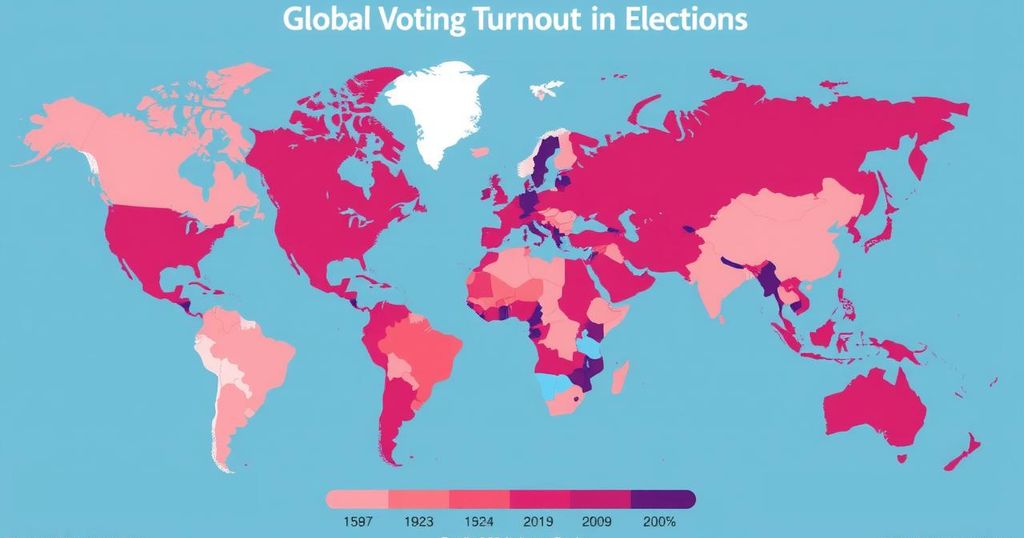2024 Elections: A Global Reflection on Democracy’s Evolution

In 2024, over 60 countries voted, revealing a continued tendency towards self-interest and short-term considerations among voters. Economic concerns dominated elections in many industrialized nations, leading to the dismissal of several incumbents. Noteworthy outcomes included Donald Trump’s return in the U.S. and significant losses for leaders in India and South Africa, indicating a shift in global political dynamics amidst ongoing economic hardships.
In the momentous year of 2024, over 60 nations—accounting for almost half of the global population—conducted elections, marking a historic shift in democratic engagement. Despite this significant voter turnout, the results illuminated a persistent inclination toward self-interest, tribalism, and immediate economic concerns over collective welfare. Key elections, notably the United States and European nations, reflected how voters prioritized economic stability over long-term issues like climate change.
In many industrialized countries, pressing economic concerns dominated electoral discussions, overshadowing vital issues such as environmental sustainability. For instance, in the United Kingdom, Keir Starmer’s Labour Party capitalized on economic dissatisfaction to secure a decisive victory after a prolonged period in opposition. Similarly, President Joe Biden’s leadership faced scrutiny as inflation persisted, prompting many voters to lean toward his opponent, Donald Trump.
This trend was echoed across numerous countries where incumbents faced backlash due to economic hardship, a situation exacerbated by factors like the ongoing impacts of COVID-19 and heightened energy prices stemming from geopolitical tensions. In India, Prime Minister Narendra Modi’s popularity waned, while in South Africa, the ruling party lost its majority for the first time since Nelson Mandela. Although Bangladesh’s Sheikh Hasina won another term, public trust remained low, as protests highlighted a disconnect between leadership and popular sentiment.
Among the most notable outcomes, Donald Trump’s return to power in the United States stood out as particularly consequential. In contrast, France’s Emmanuel Macron navigated a complex electoral landscape following a surprising performance by populists in prior elections, ultimately leading to a conservative prime minister’s appointment. This dynamic underscores how voters are increasingly driven by economic realities rather than adherence to historical political norms.
Moreover, Vladimir Putin’s overwhelming electoral support in Russia raised concerns about the true essence of democracy, given the suppression of dissent and media control prior to the elections. This stark contrast exemplifies the ongoing struggle between democratic ideals and autocratic governance, particularly evident in regions affected by his aggressive policies, such as Ukraine.
As the year concluded, observers stressed the importance of considering how one nation’s electoral decisions resonate globally, shaping policies and international relations. As the global democratic experiment retains momentum, it is crucial to learn from these elections to foster genuine engagement and informed choices in the future.
The year 2024 witnessed an unprecedented level of electoral participation globally, with nearly half the world’s population engaging in democratic processes across multiple countries. The results of these elections provide critical insights into the prevailing attitudes towards governance, economic concerns, and voter behavior. As nations navigate the complexities of modern political landscapes—impacted by economic challenges, environmental issues, and shifting power dynamics—analyzing these outcomes will be essential to understanding the broader implications for democracy worldwide.
In summary, the electoral outcomes of 2024 reveal a world grappling with immediate economic realities, often at the expense of long-term considerations such as climate sustainability and democratic values. The significant voter turnout across 60 countries indicates a robust commitment to democratic engagement, yet the results affirm a tendency towards populism and short-termism. As global dynamics continue to evolve, it becomes imperative for individuals and leaders alike to prioritize policies that align with collective well-being, ensuring that democracy matures in its capacity to address both present and future challenges.
Original Source: www.cnn.com







